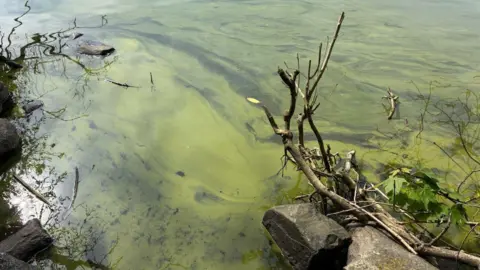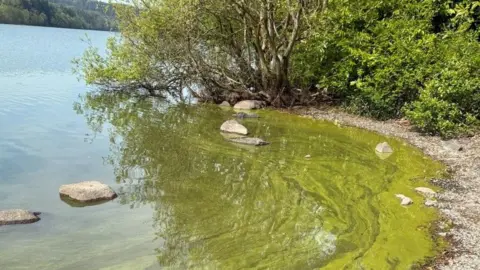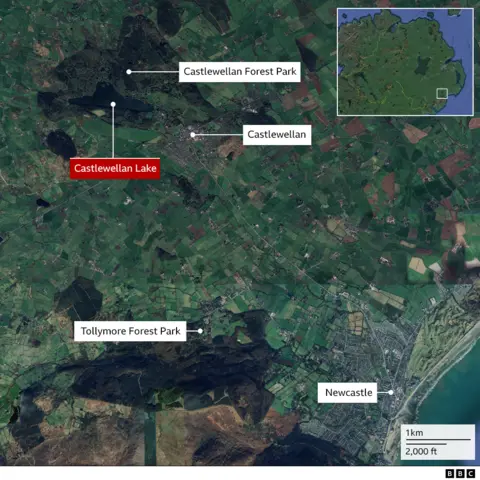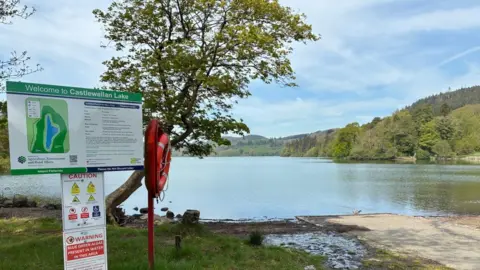Triathlon entries postponed over blue-green algae in lake
 Chris Campbell
Chris CampbellBlue-green algae could disrupt an annual triathlon for the second consecutive year, the director of the race has said.
Chris Campbell said entries for the 2025 Mourne Sprint Triathlon in Castlewellan Forest Park in County Down had been postponed over fears the water quality posed a safety hazard for swimmers.
The 2024 race had to be adapted at the last minute to a run-bike-run duathlon due to similar health concerns.
Exposure to high levels of any blue-green algae blooms - whether by contact with water blooms, swallowing that water or inhaling airborne droplets - can cause health effects in people and animals.
'I'm not confident'
Race director Chris Campbell said significant blue-green algal blooms had appeared in Castlewellan lake over the past few weeks.
He said it seemed unlikely the water quality would be up to standard by the day of the race on 30 August.
"I'm not confident it will go ahead at all this year," he said.
"We would need a lot of rain to clear it."
Newry Mourne and Down District Council said it was continuing to monitor the lake.
A spokesperson said people should not enter the water, drink the water, catch or eat fish from the lake and should keep animals away from the lake.
'Issue beyond just Lough Neagh'
The Department of Agriculture, Environment and Rural Affairs (Daera) said whilst no reports of blue-green algae at Castlewellan Lake have been received by the Northern Ireland Environment Agency (NIEA) in 2025, they would urge people to report any incidents via the Bloomin' Algae app or the emergency pollution hotline.
"Any decision made to restrict access or activities on the lake is a matter for the site operator or event organiser," Daera said in a statement.
"Minister Muir takes the concerns of triathletes seeking to use Castlewellan Lake very seriously proving that water quality is sadly an issue beyond just Lough Neagh."
 Chris Campbell
Chris CampbellOlympian Triathlon Belfast said it would re-examine the situation on 1 June and make a final decision on whether to let the race go ahead or to call it off.
Mr Campbell said it was very disappointing that the group seemed to be in the same position for a second year running.
In 2024 the swimming leg was cancelled after it was confirmed blue-green algae was present in Castlewellan Lake.
Mr Campbell said they were told "at the very last minute", by Newry, Mourne and Down District Council, that blue-green algae meant it would not be safe to enter the water.
The group had already received 400 entries for the race so decided to adapt the event rather than cancel it.
 Bethany Chisholm
Bethany ChisholmStephen Chisholm from Belfast was due to take part in the 2024 race but decided not to compete in the duathlon.
"Taking the swim element out for me was removing a huge part of the challenge", he said.
"Triathlon is unique in that it's three sports one after the other and it's not often that someone can do all three back to back or even in a single day."
He said it was disappointing to miss out on the event.
"This was to be my final official race of the year and one last chance to see the results of my training throughout the year", he said.
"I love open water swimming and Castlewellan is a stunningly beautiful location so it was a real shame to miss this."
He said he planned his own Olympic distance triathlon on the day of the race instead, with the swimming leg at Helen's Bay near Crawfordsburn.

Organisers Olympian Triathlon Belfast said the blue-green algae appeared to be worse in recent weeks than it was in 2024.
It added that the advisory notice placed at the water's edge by Newry, Mourne and Down District Council instructing people not to bathe in the lake had remained in place since last August.
"With warm weather and sunshine forecast, it's likely more and more algae will bloom," Mr Campbell said.
"Many people ignore the council's notice and continue to paddleboard and fish in the lake.
"But as event organisers we can't take that risk. We can't have 400 swimmers and 200 of them getting sick."
 Chris Campbell
Chris CampbellOlympian Triathlon Belfast said it was looking into alternative venues for the event.
"The fear is, blue-green algae could be a problem at any bathing site in Northern Ireland," Mr Campbell said.
"It doesn't seem to us that much is being done about this."
Blue-green algae in Northern Ireland
Blue-green algae, technically known as cyanobacteria, is a collection of microscopic organisms that are naturally present in lakes and streams.
Under certain conditions, blue-green algae can become abundant in warm, shallow, undisturbed, nutrient-rich surface waters that receive a lot of sunlight.
When this occurs, the algae can form blooms that discolour the water or produce floating mats or scums on the water's surface.
